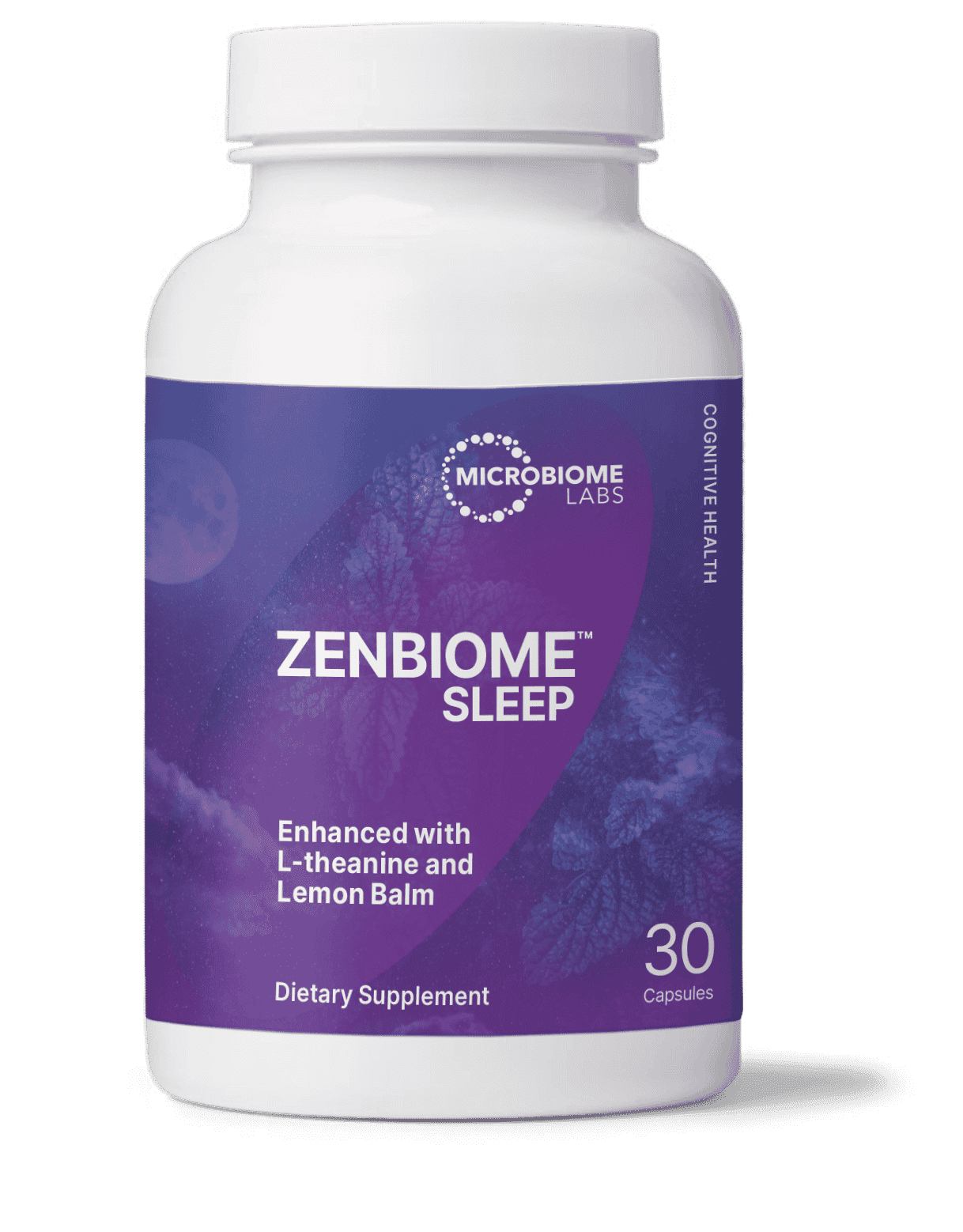Product Description
Psychobiotic Probiotic to Help with Occasional Sleeplessness
Clinically Studied Unique Strain of Bifidobacterium longum — 1714™ Strain Combined with L-theanine and Lemon Balm
Zenbiome SLEEP is formulated to help deal with occasional sleeplessness, but can also help support feelings of relaxation and reduced tension. Zenbiome SLEEP promotes alpha brain waves.
(Alpha waves measure between 8 and 12 Hz and occur when people feel relaxed and when the brain is disengaged without concentrating on anything.)
Zenbiome SLEEP is a psychobiotic powered by the 1714 strain, a unique strain of Bifidobacterium longum with an exopolysaccharide clinically shown to support a calm mind and quality sleep.
Zenbiome SLEEP is further enhanced with L-theanine and lemon balm to further support the body’s natural sleep cycles.
What is a Psychobiotic?
“Psychobiotics are defined as probiotics that confer mental health benefits to the host when ingested in a particular quantity through interaction with commensal gut bacteria.”
— from “Psychobiotics: Mechanisms of Action, Evaluation Methods and Effectiveness in Applications with Food Products,” Nutrients, 2020
The Gut-Brain Axis and the Psychobiome
The gut-brain axis, a bidirectional communication between gut microbiota and the central nervous system (CNS), may play a role in cognitive function, digestion, and mood.
Studies show that 80-90% of the fibers in the vagus nerve are linked to the gut, providing a physical link through which the gut microbiota communicate with the brain.
Relatedly, the term psychobiome is used to describe the interaction between a person’s collective microbiome and their mental state.
A diverse and balanced microbiome can help maintain the gut-brain axis. A psychobiotic is used to describe the commensal bacteria that play a role in the gut-brain axis and support brain health.
1714™: A Trail-blazing Psychobiotic — the Research
1714™, a unique strain of Bifidobacterium longum, is an up-and-coming psychobiotic that can help support the management of occasional stress and its biochemical expression within the human body.
This psychobiotic exerts its effect by targeting the HPA axis to support healthy cortisol levels. 1714™ may support mental health, cognitive process, neurotransmitters, and overall feeling of well-being.
In a 4-week human trial, 1714™ reduced perceived stress, improved memory performance, reduced mental fatigue, positively supported brainwave activity, and improved ability to handle occasional stress.
About Psychobiotics and the Gut-Brain-Microbiota Axis
“The gut-brain-microbiota axis consists of a bilateral communication system that enables gut microbes to interact with the brain, and the latter with the gut. Gut bacteria influence behavior, and both depression and anxiety symptoms are directly associated with alterations in the microbiota.”
“The action mechanisms by which bacteria exert their psychobiotic potential has not been completely elucidated. However, it has been found that these bacteria provide their benefits mostly through the hypothalamic-pituitary-adrenal (HPA) axis, the immune response and inflammation, and through the production of neurohormones and neurotransmitters.
This review aims to explore the different approaches to evaluate the psychobiotic potential of several bacterial strains and fermented products.
The reviewed literature suggests that the consumption of psychobiotics could be considered as a viable option to both look after and restore mental health, without undesired secondary effects, and presenting a lower risk of allergies and less dependence compared to psychotropic drugs.”
— Excerpts from “Psychobiotics: Mechanisms of Action, Evaluation Methods and Effectiveness in Applications with Food Products,” Nutrients, 2020
Why are L-theanine and Lemon Balm Included in Zenbiome SLEEP?
L-theanine is an amino acid found in green and black tea and some mushrooms. It’s a relaxing amino acid and has been found to promote more alpha brain waves, the kind of waves that people have when they feel relaxed and when the brain is disengaged without concentrating on anything.
L-theanine plays role in the formation of GABA (Gamma-aminobutyric acid), a neurotransmitter that helps us modulate and handle stress. L-theanine is non-sedating.
Lemon Balm has been used as medicine for over a thousand years and is a calming herb. Research has show that it may help with insomnia.
From Microbiome Labs









